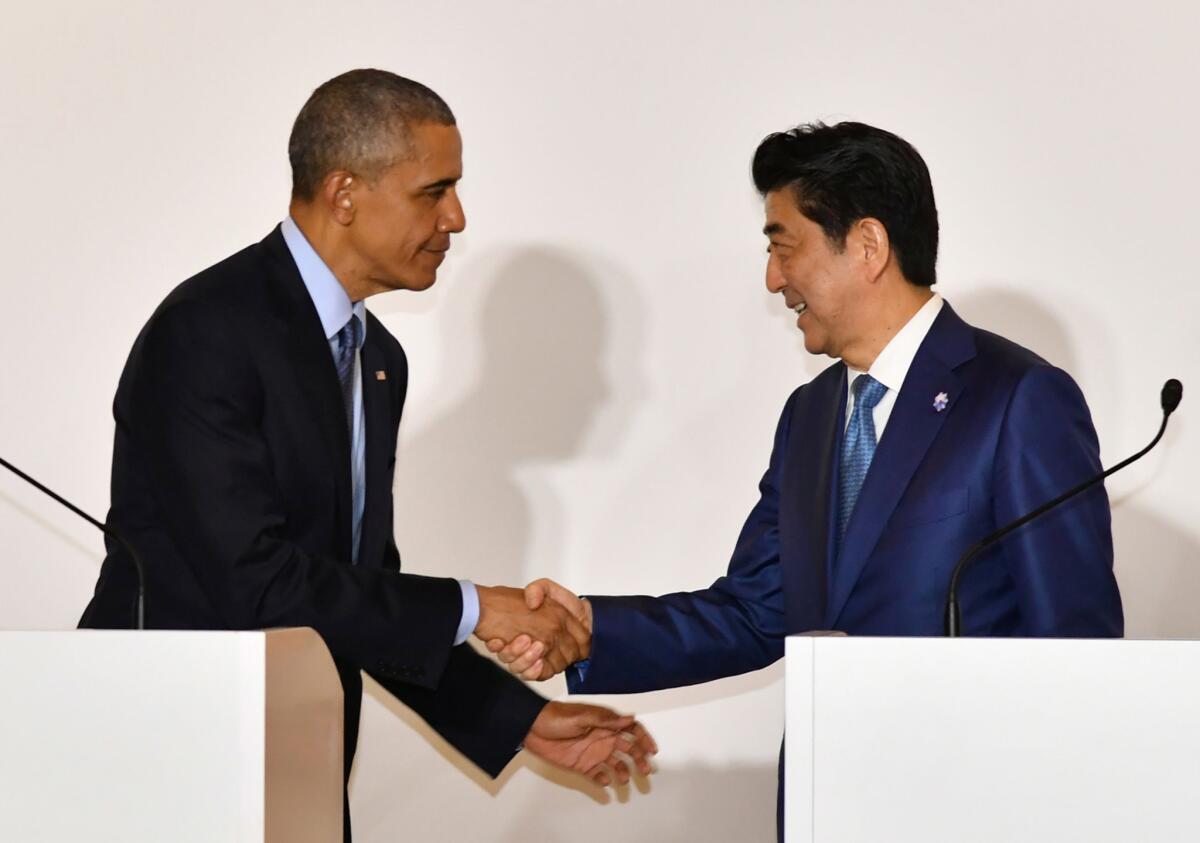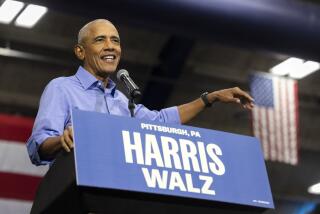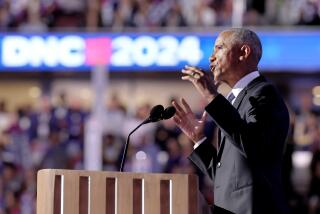Obama can’t endorse during the Democratic primary, so he’s just pointing out how hard the job is instead

Reporting from Ise-Shima, Japan — He met with heads of state, lawmakers and a battery of dissidents, in between lifting a half-century-old trade embargo and negotiating access to key ports.
By the time President Obama filed past more than 2 million people lining the streets of Ho Chi Minh City, Vietnam, and flew to Japan for Thursday’s Group of Seven summit, his trip abroad had not so subtly served a purpose beyond foreign relations: to help Democrats campaign against Donald Trump.
Pledging to stay neutral in the Democratic primary, Obama has instead struck a middle ground to help the party’s likely nominee, Hillary Clinton. He has engaged in a twist on the so-called Rose Garden campaign strategy, in which incumbent presidents lean on the trappings of their office to remind voters of their power and achievements. Obama is instead reminding voters of the seriousness of the job and, by extension, his apparent belief that Trump isn’t fit for it.
Election 2016 | Live coverage on Trail Guide | Track the delegate race | Sign up for the newsletter
On Friday, this president who has repeatedly pointed to the heady challenges on his desk as an argument against making a former reality show star the next commander-in-chief travels to Hiroshima, where one of two nuclear bombs ever used in warfare was dropped, to underscore the horrors of war and the life-or-death decisions that presidents face.
Though he talked campaign politics with world leaders at the summit, Obama doesn’t plan to discuss the topic once he makes the pilgrimage to Hiroshima to pay homage to victims of the atomic blast that killed about 140,000 people, a grim reminder of the devastating impact of a nuclear attack.
But the trip nonetheless provides a vivid illustration for the question Obama wants voters to ask themselves as they consider a presidential candidate — can you trust this person with the nuclear codes?
World leaders are worried about Trump’s rise, Obama suggested on Thursday, pressed by reporters to weigh in on Trump.
“They are not sure how seriously to take some of his pronouncements but they’re rattled by him, and for good reason,” Obama said. “A lot of the proposals that he has made display either ignorance of world affairs or a cavalier attitude or an interest in getting tweets and headlines instead of actually thinking through what it is required to keep America safe.”
White House officials say that the president is eager to begin making a case to voters about the stakes of the race to replace him in the Oval Office, and will do so vigorously once the primaries are over.
“We’re getting close to that, but we’re not there yet,” White House Press Secretary Josh Earnest reminded reporters recently.
The president’s pledge of neutrality in the Democratic presidential primary seemed like an easy call when the GOP was slugging its way to a convention floor fight. But it’s become decidedly more problematic as Republicans have now had weeks to begin a fence-mending dance with Trump, while Democrats Clinton and Bernie Sanders will probably continue to lock horns for weeks.
His June schedule opened up after aides persuaded Obama – itching to campaign – that he had to wait.
As a result, Obama has time and energy to travel but no specific candidate he can name.
The solution, advisors say, is to leverage the tools he can use – his airplane, his podium and his voice.
That strategy dovetails with an early line of attack against Trump from Clinton, whose advantage with both pledged and superdelegates has her on the cusp of clinching the Democratic nomination next month.
Campaigning in Orange County on Wednesday, Clinton offered a lengthy list of Trump’s various pronouncements on foreign policy, including threats to pull out of NATO that she said had her “especially concerned.”
“We live in a dangerous world,” Clinton said. “We need a steady, strong hand in order to make the best decisions.”
Trump, for his part, appears undeterred. Just hours after Obama met with Japan’s prime minister here, the Republican told an audience in Anaheim that perhaps it was time for the U.S. to abandon its military bases in Japan.
“Maybe Japan has to defend itself,” he said.
He also criticized Clinton for voting to authorize the Iraq war when she was a senator and called her handling of Libya as secretary of State a “catastrophe.”
“If she wins, you better get used to it, because you’ll have nothing but turmoil,” he said. “And you’ll have nothing more than four more years of Obama.”
Even if Obama doesn’t mention Trump by name, he can find ways to drop subtle hints to the candidate whose pitch to voters revolves around his deal-making ability as an experienced real-estate developer.
“My general role in all this is not actually to broker deals and sign contracts,” Obama joked at a town hall meeting with young Vietnamese entrepreneurs, including one who asked for a contract to do business in the U.S. “That is somebody else’s job.”
“See if you can make a deal,” he said. “Good luck.”
Trump was clearly on the minds of Obama’s audiences in Asia.
At the session with young people in Ho Chi Minh City, one woman asked what Obama thought would happen with “Mr. Sanders or Mrs. Hillary or maybe Mr. Trump” in office.
Obama was elliptical, and offered an analysis based on the assumption that friends and allies around the world are worried about the rise of Trump.
“Other countries look at our election system and people think, ‘Wow, what a mess!’” Obama said. “Sometimes our politics doesn’t express all the goodness of the people. But usually eventually the voters make good decisions.”
“One of the great things about the United States is that, even when it makes mistakes, I think it’s able to … correct course and take different steps,” he said, before ending with, “Things are going to be OK. I promise.”
Through it all, though, he never uttered Trump’s name.
For Obama, the stakes are clear: his successor can help to build on or work to undo some of his signature accomplishments, from the Affordable Care Act and Wall Street reforms enacted with the help of a Democratic Congress early in his administration to unilateral steps on immigration and the economy he’s taken more recently, including a new rule on overtime pay this month.
The administration said the decision to stay out of the Democratic primary race is about one goal: party unity.
See more of our top stories on Facebook >>
“He’s going to play a role in unifying this party as we come out of Philadelphia, but he’s being very careful with his timing,” said Sen. Richard J. Durbin (D-Ill.). “He doesn’t want to step on the primary process or on the ambitions of either of these presidential candidates.”
By waiting until after the nominee is chosen, Obama can leverage his overwhelming popularity with Democrats and his improved standing with the electorate as a whole to bring together formerly warring factions.
“The greatest gift President Obama could give to Secretary Clinton this election season is an approval rating above 50%,” said Kevin Madden, a Republican strategist who worked on both of Mitt Romney’s presidential campaigns. “Everyone expects President Obama, at some point, to hit the trail in an effort to help Secretary Clinton. ... But the longer he can stay apolitical, look like he’s staying above the fray and keep his approval rating above water, the better that could be for Clinton in November.”
Parsons reported from Ise-Shima and Memoli from Washington. Times staff writers Michael Finnegan in Anaheim and Seema Mehta in Buena Park, Calif., contributed to this report.
For more White House coverage, follow @cparsons and @mikememoli on Twitter.
ALSO
Obama presses Vietnamese on human rights abuses as dissidents are barred from meeting him
At a rowdy but peaceful rally in Anaheim, Trump hits immigration hard
Hillary Clinton broke the rules for using private email, State Department says
UPDATES:
9:06 a.m.: This article has been updated with additional details and background.
5:26 a.m.: This article has been updated with Obama’s comments on Trump.
This story was originally published at 3 a.m.
More to Read
Sign up for Essential California
The most important California stories and recommendations in your inbox every morning.
You may occasionally receive promotional content from the Los Angeles Times.












